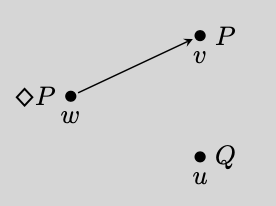accessibility relation on:
[Wikipedia]
[Google]
[Amazon]
 An accessibility relation is a
An accessibility relation is a
Logique et Analyse
No. 117–118, pp. 69–79, 1987. * Fitelson, Brandon; ''Notes on "Accessibility" and Modality'', 2003. * Brown, Curtis; ''Propositional Modal Logic: A Few First Steps'', 2002. * Kripke, Saul; ''Naming and Necessity'', Oxford, 1980. * *
List of most of the more popular modal logics. {{DEFAULTSORT:Accessibility Relation Possible world Binary relations
 An accessibility relation is a
An accessibility relation is a relation
Relation or relations may refer to:
General uses
* International relations, the study of interconnection of politics, economics, and law on a global level
* Interpersonal relationship, association or acquaintance between two or more people
* ...
which plays a key role in assigning truth values to sentences in the relational semantics for modal logic
Modal logic is a kind of logic used to represent statements about Modality (natural language), necessity and possibility. In philosophy and related fields
it is used as a tool for understanding concepts such as knowledge, obligation, and causality ...
. In relational semantics, a modal formula's truth value at a ''possible world
A possible world is a complete and consistent way the world is or could have been. Possible worlds are widely used as a formal device in logic, philosophy, and linguistics in order to provide a semantics for intensional and modal logic. Their met ...
'' can depend on what is true at another possible world , but only if the accessibility relation relates to . For instance, if holds at some world such that , the formula will be true at . The fact is crucial. If did not relate to , then would be false at unless also held at some other world such that .
Accessibility relations are motivated conceptually by the fact that natural language
A natural language or ordinary language is a language that occurs naturally in a human community by a process of use, repetition, and change. It can take different forms, typically either a spoken language or a sign language. Natural languages ...
modal statements depend on some, but not all, alternative scenarios. For instance, the sentence "It might be raining" is not generally judged true simply because one can imagine a scenario where it is raining. Rather, its truth depends on whether such a scenario is ruled out by available information. This fact can be formalized in modal logic by choosing an accessibility relation such that if is compatible with the information that is available to the speaker in .
This idea can be extended to various applications of modal logic. In epistemic logic, one can use an epistemic notion of accessibility where for an individual if does not know something which would rule out the hypothesis that . In deontic logic, one can say that if is a morally ideal world given the moral standards of . In the application of modal logic to computer science, possible worlds can be understood as representing possible states of a system and the accessibility relation can be understood as representing state transitions (see Kripke structure (model checking)). Then if the system can transition from state to state .
Different applications of modal logic can suggest different restrictions on admissible accessibility relations, which can in turn lead to different validities. The mathematical study of how validities are tied to conditions on accessibility relations is known as ''modal correspondence theory''.
See also
*Propositional attitude
A propositional attitude is a mental state held by an agent or organism toward a proposition. In philosophy, propositional attitudes can be considered to be neurally realized, causally efficacious, content-bearing internal states (personal princip ...
* Modal depth
References
* Gerla, G.; ''Transformational semantics for first order logic''Logique et Analyse
No. 117–118, pp. 69–79, 1987. * Fitelson, Brandon; ''Notes on "Accessibility" and Modality'', 2003. * Brown, Curtis; ''Propositional Modal Logic: A Few First Steps'', 2002. * Kripke, Saul; ''Naming and Necessity'', Oxford, 1980. * *
List of most of the more popular modal logics. {{DEFAULTSORT:Accessibility Relation Possible world Binary relations